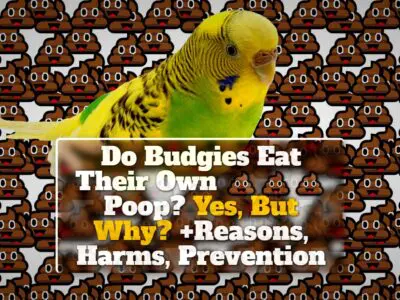Budgies’ need for grit or gravel is a topic of ongoing debate.
While some vets believe that budgies don’t require grit due to their specific eating habits, others opine that a small monthly quantity can aid digestion.
However, it’s crucial to weigh potential benefits, like aiding digestion and providing calcium, against potential harms like gastrointestinal impaction and malnutrition.
Delving into the avian world, you’ll stumble upon varying perspectives on the necessity of grit and gravel for budgies.
Despite its popularity, the pet care realm remains divided about its pros and cons.
In this article, we’ll explore these contrasting viewpoints, alongside the potential benefits and harms grit and gravel pose to these feathered friends.
There Is Still A Debate About Whether Budgies We Should Give Grit, Gravel Or Not
What Caused This Controversy?
It’s a tantalizing conundrum, isn’t it? To give or not to give grit to budgies – the answer isn’t straightforward.
It originated from the observation that budgies, unlike pigeons and doves, peel off the outer hull of seeds before ingestion, seemingly eliminating the need for a grinding substance in their digestive system.
Grit and gravel were traditionally seen as essential for the mechanical breakdown of food, especially for birds consuming seeds whole.
But as we know, budgies don’t fall into this category, stirring the debate.
Some Avian Vets Consider It Unnecessary For Caged Birds Such As Budgies To Eat Grit, Gravel
In the world of avian veterinary medicine, there’s a section of experts who believe that it’s unnecessary for caged birds, especially budgies, to consume grit or gravel.
The basis of this viewpoint lies in the unique dietary behavior of budgies.
They argue that budgies’ process of eating seeds – which involves hull removal prior to kernel ingestion – eliminates the requirement for grit, which is traditionally viewed as a digestive aid.
Birds Such As Budgies Remove The Seed’s Outer Hull Before Eating The Kernel
Diving deeper into the budgie’s diet, these small, colorful birds have a remarkable feeding behavior.
Unlike some bird species, budgies meticulously remove the outer hull of seeds before eating the kernel.
This practice is instinctive, a behavior they have inherited from their wild ancestors.
Thus, the kernel is already free from the hard, indigestible outer shell by the time it enters the budgie’s digestive system.
This is a significant reason why some vets consider grit or gravel unnecessary for budgies.
Some Avian Vets Find That A Pinch Of Grit, Gravel Per Month Will Help With The Grinding Process
On the other side of the spectrum, there are avian vets who advocate a moderate use of grit or gravel for budgies.
They suggest that a small quantity, approximately a pinch, per month can aid the budgies’ digestive process.
This stance maintains that the hard texture of the grit can serve as a tool for grinding down food particles in the gizzard, an organ designed to break down food in birds.
Grit Helps Budgies With The Food Grinding Process
To understand why some experts endorse grit intake, it’s necessary to delve into the physiological workings of a bird’s digestive system.
Grit acts as a surrogate set of teeth inside a bird’s gizzard, aiding in the grinding down of food particles.
This grinding action breaks down the food into smaller pieces, making it easier for the bird to extract and absorb the nutrients it needs to stay healthy.
Consequently, a small quantity of grit can facilitate efficient digestion in budgies, according to some avian experts.
What Are The Benefits Of Grit, Gravel For Budgies?
While the need for grit in a budgie’s diet is disputed, those advocating its usage highlight several benefits.
They argue that the inclusion of grit or gravel can offer a variety of advantages ranging from aiding digestion to enhancing mental stimulation.
Let’s delve into these benefits:
Digestion
One primary advantage of grit consumption is its potential role in digestion.
Budgies, like many other birds, possess an organ called the gizzard that grinds down food.
The gizzard, however, lacks teeth, so it needs some form of hard substance to facilitate this grinding process.
Grit, in the right amounts, can serve this purpose, helping to break down the food further, thus improving the extraction of nutrients.
Nutrient Source
Grit or gravel, especially those made from oyster shells or cuttlefish bones, can act as a supplementary nutrient source.
These types of grit are rich in essential minerals, particularly calcium, which is crucial for bone health and the production of eggshells in female budgies.
By incorporating a small quantity of this specific grit, owners can provide an additional source of these important minerals to their pets.
Beak Health
Grit also plays a role in maintaining beak health.
Much like the nails on a human, a budgie’s beak continually grows and requires regular maintenance to prevent overgrowth.
The hard, coarse texture of grit can serve as a natural filing instrument, allowing budgies to chew and scrape their beaks on it, aiding in beak health and shape.
Behavioral Enrichment And Mental Stimulation
For our feathered friends, engaging in natural behaviors contributes to their overall well-being.
One such behavior is foraging, which can be encouraged by offering grit.
The act of sifting and picking through grit can provide behavioral enrichment, stimulating the budgie’s instinctive behaviors and enhancing its overall wellbeing.
Mental stimulation is also an essential factor in a budgie’s health and happiness.
Engaging activities, such as pecking at and foraging for grit, can keep a bird mentally occupied.
Thus, providing a small quantity of grit can contribute to their overall mental stimulation and enrich their environment.
What Are The Possible Harms Of Grit, Gravel For Budgies?
While the potential benefits of grit have been mentioned, it is equally important to consider the potential drawbacks.
It’s a complex issue, as the possible adverse effects of grit consumption in budgies can range from physical hazards to health misinterpretations.
Here, we will examine these potential risks in depth.
Gastrointestinal Impaction
The first potential harm is gastrointestinal impaction.
This condition arises when budgies ingest excessive quantities of grit, leading to a blockage in their digestive tract.
This obstruction can result in discomfort, can prevent the budgie from properly digesting its food, and in severe cases, can be life-threatening.
Digestive Tract Damage
Another risk stems from the physical characteristics of the grit itself.
Some forms of grit can have sharp edges that can potentially cause digestive tract damage.
This could lead to injuries to the bird’s crop or gizzard, which in turn could cause discomfort, infection, or serious illness.
Malnutrition
Malnutrition is another potential problem that could arise from grit consumption.
If budgies fill up on grit, they might eat less of their regular food.
This could lead to a deficiency in essential nutrients over time if they’re not receiving the nutrients they need from their standard diet.
Choking Hazard
Grit, especially larger pieces, can also present a choking hazard.
Small birds like budgies can have difficulties processing larger grit pieces, which could potentially lead to choking incidents.
Misinterpretation Of Health Issues (Consuming More Than They Need)
A budgie consuming more grit than usual might be an indicator of an underlying health issue, such as an upset stomach.
Owners might wrongly interpret this increased consumption as a sign that the bird needs more grit, when in reality, it may be a symptom of a different problem, leading to a misinterpretation of health issues.
Faqs
What Is The Difference Between Budgies And Pigeons, Doves In Terms Of Need For Grit, Gravel?
Well, the difference is all about their eating habits.
Budgies peel off the seed’s outer hull before consuming the kernel, whereas pigeons and doves consume seeds whole.
This leads to a greater need for grit in birds like pigeons and doves for mechanical digestion.
What Types Of Gravel Are Safe For Budgies?
When considering gravel types, go for ones devoid of sharp edges, which can harm your budgie’s digestive tract.
Calcium-rich gravel, like those from oyster shells or cuttlefish bones, are generally safe and beneficial.
How Much Gravel Should Budgies Consume?
Opinions vary, but some vets suggest giving just a pinch of gravel to your budgie monthly, preventing potential overconsumption while possibly aiding the food grinding process in the gizzard.
How Can The Disagreement About Grit Consumption In Budgies Be Explained?
The argument primarily comes from the unique eating behavior of budgies.
Unlike birds like pigeons and doves that consume seeds whole, budgies meticulously remove the seed’s outer hull before ingesting the kernel.
This has led to different schools of thought – some vets suggesting budgies don’t require grit, while others propose a small quantity can aid digestion.
What Are Some Alternatives To Grit For Providing Essential Nutrients To Budgies?
Yes, budgies can obtain essential minerals like calcium from alternatives to grit.
One can consider mineral blocks and cuttlebones, both of which not only supply necessary nutrients but also present a hard surface for beak maintenance.
What Measures Should I Take To Ensure Safe Grit Consumption By My Budgie?
If you opt to provide grit to your budgie, it’s crucial to manage the quantity, preventing overconsumption.
The generally accepted amount is a pinch per month.
Also, you should choose grit without sharp edges that might injure your bird’s digestive tract.
Calcium-rich grits like those derived from oyster shells or cuttlefish bones are generally considered safe and beneficial.
How Can I Identify If My Budgie Is Overconsuming Grit?
If your budgie is overconsuming grit, you might observe signs like a loss of appetite for regular food, digestive issues, and abnormal droppings.
It’s crucial to consult an avian vet in such scenarios.
Importantly, remember that increased grit consumption could indicate other underlying health problems which need immediate attention.



